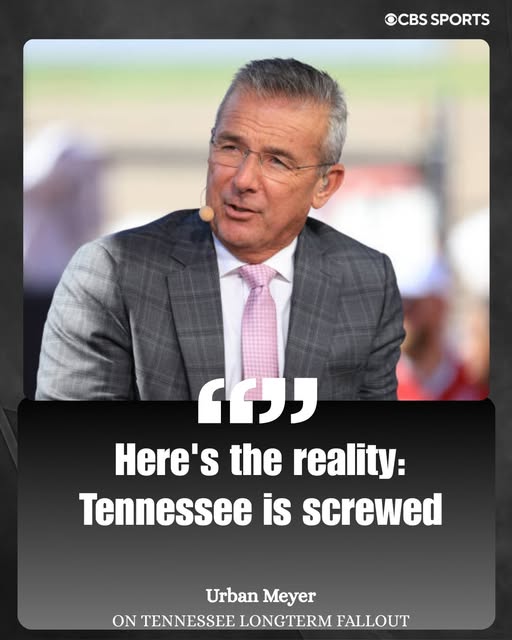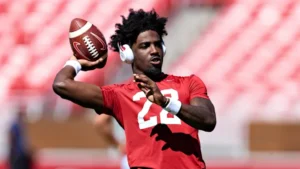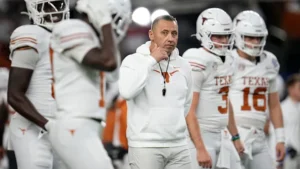
Urban Meyer is sounding the alarms
Urban Meyer is a name that resonates with many football fans, especially those in the world of college football. As a coach, he has built an impressive legacy, winning national championships with the University of Florida and The Ohio State University. However, his career has not been without controversy. Over the years, Meyer has faced numerous challenges and criticisms related to his coaching style, his handling of player behavior, and his ability to manage high-stress situations. In recent years, Meyer has sounded the alarm on various issues related to the state of college football, and this raises questions about his perspective on the sport’s current trajectory.
This essay will explore the concerns that Urban Meyer has raised regarding the state of college football, as well as how his experiences as both a coach and a commentator give him unique insights into the evolving landscape of the sport. We will also examine the broader implications of Meyer’s warnings, considering how his insights might influence future trends in college football, player development, and coaching strategies.
Urban Meyer’s Background and Legacy
Urban Meyer’s career has been marked by both outstanding success and significant controversy. After his early coaching stints at various programs, Meyer’s breakthrough moment came at the University of Utah, where he transformed the team into a national contender. His success at Utah led him to Florida, where he won two national championships and developed one of the most dynamic offenses in college football. Meyer’s success continued at Ohio State, where he led the Buckeyes to a national title in 2014.
However, Meyer’s career has not been without its dark moments. Throughout his tenure as a head coach, Meyer faced numerous scandals, including the domestic violence allegations against former assistant coach Zach Smith while he was at Ohio State. Meyer was heavily criticized for his handling of the situation and for not addressing the issue sooner. The scandal eventually led to Meyer being suspended for three games in 2018.
Despite the controversies, Meyer is considered one of the most successful and influential coaches in the history of college football. His experience coaching at the highest level, dealing with high-pressure situations, and managing elite players has shaped his perspective on the sport. As such, Meyer’s concerns about the direction of college football carry significant weight, given his credibility and expertise in the field.
Meyer’s Alarm on Player Safety
One of the primary alarms Urban Meyer has sounded in recent years pertains to player safety, especially in light of increasing concerns about concussions and the long-term effects of brain injuries. Meyer has been vocal about the physical toll that college football takes on players, particularly in relation to head injuries. He has highlighted how the increasing speed and violence of the game make it more dangerous than ever before.
Meyer’s concern about player safety is not unique; many coaches, medical professionals, and former players have voiced similar concerns. However, Meyer’s perspective is particularly important because of his experience coaching in the modern era of college football, where the game has evolved into a much faster and more physically demanding sport. Meyer’s alarm comes at a time when the NCAA has made efforts to address player safety through rule changes, such as stricter targeting penalties and guidelines on concussion protocols. Yet, despite these efforts, Meyer argues that more needs to be done to protect players from the long-term consequences of head injuries.
Meyer has also expressed his worry about the culture surrounding football at the collegiate level, where players are often pushed to play through injuries in the name of competition and team success. He has pointed out the pressure that athletes face to perform despite being injured, which could exacerbate the risks to their long-term health. Meyer’s warning about the lack of adequate protection for players is a call to action for the sport’s stakeholders, including the NCAA, coaches, and medical professionals, to take player safety more seriously.
The Changing Landscape of College Football
Another major alarm Meyer has sounded pertains to the shifting landscape of college football, particularly the rise of the Transfer Portal and Name, Image, and Likeness (NIL) legislation. These changes are revolutionizing the way college football programs operate, and Meyer has expressed concerns about their long-term impact on the sport.
The introduction of the Transfer Portal has allowed players to transfer between programs more freely, which has drastically changed the way recruiting works in college football. Meyer has expressed concern that the portal is turning college football into a “free agency” system, where players can leave teams at will without any long-term commitment. This, according to Meyer, undermines the stability and tradition of college football programs. Coaches are now faced with the constant challenge of managing a roster that could change dramatically year-to-year, making it difficult to build long-term success.
Additionally, the NIL rules have opened up new opportunities for college athletes to profit off their personal brand, which has led to significant changes in the recruiting process. Meyer has warned that the influx of money into college football could have unintended consequences, such as creating imbalances between programs with larger financial resources and those without. He has also raised concerns about the impact of NIL deals on the mental health and focus of college athletes. Meyer worries that the pressure to capitalize on NIL opportunities could distract players from their academic and athletic responsibilities, potentially leading to a decline in the quality of the sport.
Meyer’s concerns about these changes in college football highlight the challenges that the sport faces as it evolves in response to shifting societal and economic dynamics. While many of the changes, such as NIL, are designed to provide greater rights and opportunities for players, Meyer is warning that these developments could lead to instability in the sport and undermine the values that have traditionally defined college football.
The Decline of Coaching Excellence
Another aspect of Meyer’s critique of modern college football is the decline in coaching excellence. As the game has become more complex and demanding, Meyer believes that the quality of coaching has decreased in some areas. Meyer has suggested that the pressure to win has led to an increasing focus on recruiting and business-side operations, sometimes at the expense of developing players and coaching them at the highest level.
Meyer has argued that the best coaches are those who are able to build programs with a focus on player development, not just recruiting talent. He has raised concerns that in the current landscape of college football, too many coaches are relying on star recruits to win games, rather than developing the talent they have and fostering a strong team culture. This has led to a greater emphasis on flashy recruits and high-profile players, often at the expense of long-term program building.
Moreover, Meyer has pointed to the rapid turnover of coaching staffs as a sign of instability in the coaching profession. In the past, coaches would often remain at programs for long periods, building a foundation of success and creating a strong culture within their teams. Today, however, the pressure to win immediately has led to more frequent coaching changes, which Meyer believes can disrupt the continuity and development of players and programs.
The Future of College Football
Urban Meyer’s alarms about the future of college football are grounded in his deep understanding of the game’s history, culture, and evolving dynamics. While some of the changes in the sport, such as NIL and the Transfer Portal, may ultimately benefit players and promote fairness, Meyer’s warnings highlight the potential pitfalls of these changes if they are not managed properly.
Meyer’s concerns about player safety, the shifting landscape of college football, and the decline of coaching excellence all point to a broader issue: the tension between tradition and innovation. College football is a sport deeply rooted in tradition, but it is also a sport that must adapt to modern realities. Meyer’s insights underscore the need for a balance between preserving the values that have made college football great and embracing the changes that are reshaping the game.
As college football continues to evolve, Meyer’s alarms should serve as a reminder that the sport must remain mindful of its core values: the development of student-athletes, the importance of long-term success, and the safety and well-being of players. While change is inevitable, it is essential that those involved in the sport — coaches, administrators, and policymakers — work together to ensure that college football remains a positive and sustainable experience for both athletes and fans.
In conclusion, Urban Meyer’s alarm bells should not be ignored. His concerns reflect a deep understanding of the challenges and opportunities facing college football. As the sport continues to evolve, it will be important to listen to voices like Meyer’s to ensure that college football remains a beacon of excellence and integrity. While the future of the sport may be uncertain, one thing is clear: the need for thoughtful leadership and a commitment to preserving the best aspects of college football is more important than ever.





